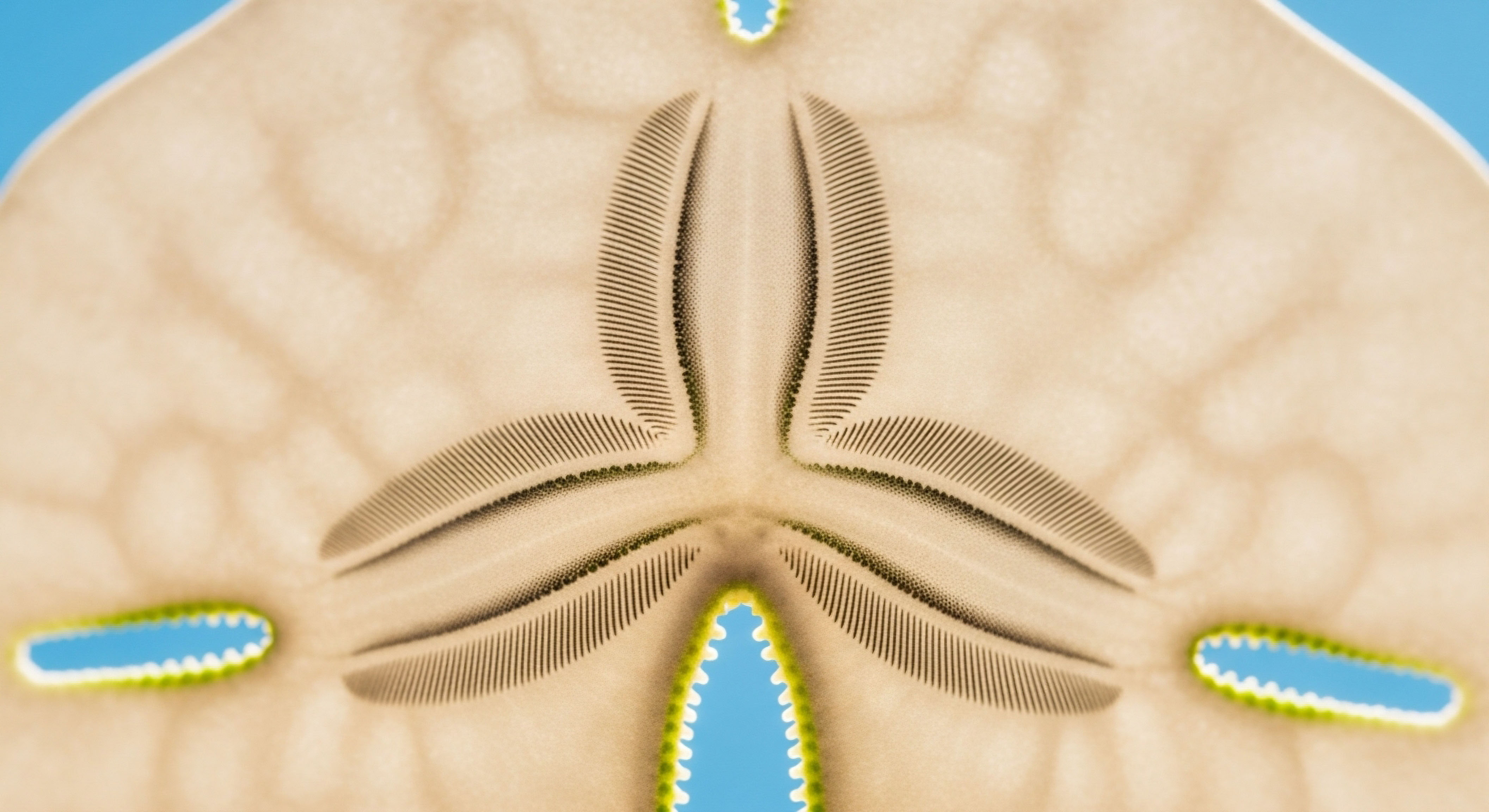

The Blueprint for Enduring Vitality
The human body represents a sophisticated biological system, a marvel of intricate design capable of remarkable resilience and performance. Yet, with the passage of time, inherent biological processes initiate a gradual deceleration, impacting energy, cognitive acuity, physical capacity, and overall vitality.
This decline is not an immutable decree of fate; it is a cascade of physiological shifts that present a unique opportunity for proactive engineering. Understanding biological control is paramount for individuals committed to transcending the limitations often associated with aging and unlocking their peak potential.
Our biological destiny is shaped by a complex interplay of genetics, environment, and lifestyle. However, the degree to which we can influence the trajectory of our health and performance lies in our capacity to understand and actively manage these biological systems.
This is the domain of biological control ∞ the deliberate application of scientific knowledge to optimize cellular function, hormonal balance, metabolic efficiency, and regenerative processes. It is about recalibrating the body’s internal mechanisms to function at a higher optimal state, extending not just lifespan, but healthspan and performance span.
The imperative for biological control stems from a desire for more than mere existence; it is about thriving. It addresses the fundamental human drive to maintain cognitive sharpness, physical strength, robust energy levels, and emotional equilibrium throughout life’s journey.
When biological systems operate in harmony, they support sustained peak performance, accelerate recovery, enhance resilience to stressors, and provide a foundation for profound personal achievement and fulfillment. This proactive approach moves beyond disease management to active optimization, viewing the body as a high-performance machine that can be meticulously tuned.
Consider the endocrine system, the body’s master regulator of hormones. Hormones are the chemical messengers that orchestrate virtually every bodily function, from mood and metabolism to muscle growth and cognitive function.
As we age, the production and sensitivity to key hormones like testosterone, estrogen, progesterone, and growth hormone can diminish, leading to a spectrum of suboptimal states including fatigue, reduced libido, increased body fat, decreased muscle mass, and impaired cognitive function. Directing these hormonal signals through informed interventions is a cornerstone of biological control.
Similarly, metabolic health underpins cellular energy production and nutrient utilization. Age-related shifts can lead to insulin resistance, mitochondrial dysfunction, and impaired energy substrate preference, manifesting as low energy, weight gain, and increased risk for chronic disease. Engineering metabolic control involves optimizing nutrient partitioning, enhancing mitochondrial efficiency, and restoring insulin sensitivity, thereby providing the body with a reliable and potent energy supply.
This level of biological mastery ensures that the body’s power sources are consistently available and efficiently utilized for all functions.
The human body, when properly understood and engineered, offers a biological reserve capable of sustaining peak performance and vitality well beyond conventional expectations.
Ultimately, the pursuit of biological control is an investment in future capability. It is the recognition that our biological substrate is the foundation upon which all our endeavors are built. By taking deliberate steps to optimize this foundation, we not only mitigate the effects of time but actively enhance our capacity to live, perform, and achieve at the highest levels. This is the essence of engineering your future self, today.


The Precision Engineering of Your Physiology
Achieving mastery over your biological systems requires a sophisticated toolkit, grounded in scientific understanding and applied with strategic precision. This engineering process involves multiple interconnected pathways, each contributing to a more robust and resilient physiological state. The core components of this engineering framework include hormone optimization, targeted peptide interventions, and metabolic recalibration.

Hormone Optimization ∞ The Master Regulators
The endocrine system provides the primary levers for biological control. Restoring optimal levels of key hormones can dramatically influence energy, mood, body composition, and cognitive function.

Testosterone and Estrogen Balance
For men, testosterone is foundational for muscle mass, bone density, libido, energy, and mood. For women, estrogen plays critical roles in cardiovascular health, bone integrity, cognitive function, and mood regulation. Age-related decline necessitates informed strategies to restore these hormones to their functional peak.
Testosterone replacement therapy (TRT), when administered under expert supervision, can re-establish anabolic signaling, improve body composition, enhance cognitive performance, and elevate overall well-being. Similarly, precise management of estrogen levels, particularly during perimenopause and menopause, is vital for maintaining long-term health and vitality.

Growth Hormone and IGF-1 Axis
The growth hormone (GH) and insulin-like growth factor 1 (IGF-1) axis is central to cellular repair, regeneration, and metabolic function. GH levels naturally decline with age, impacting tissue repair, fat metabolism, and muscle maintenance. Strategies aimed at optimizing this axis, such as judicious use of GH secretagogues, can support cellular rejuvenation and enhance the body’s capacity for recovery and adaptation.

Peptide Science ∞ Cellular Messengers of Renewal
Peptides are short chains of amino acids that act as signaling molecules within the body, influencing a vast array of biological processes. Their targeted application offers precise control over specific cellular functions.

Regenerative Peptides
Peptides like Sermorelin and Ipamorelin act as GH secretagogues, stimulating the pituitary gland to release more growth hormone in a pulsatile, natural manner. This supports improved sleep quality, enhanced fat loss, increased lean muscle mass, and accelerated tissue repair. Other peptides, such as BPC-157, exhibit potent effects on healing and inflammation reduction, aiding in the recovery of damaged tissues, including muscles, tendons, and the gastrointestinal tract.

Metabolic and Cognitive Peptides
Specific peptides can influence metabolic pathways, appetite regulation, and neurotransmitter systems. For instance, certain peptides may improve insulin sensitivity or modulate brain-derived neurotrophic factor (BDNF), supporting cognitive function and neuroplasticity. The precise application of these signaling molecules allows for fine-tuning of bodily systems.

Metabolic Recalibration ∞ Fueling Performance
Optimizing how the body produces and utilizes energy is fundamental to sustained vitality and performance.

Mitochondrial Function and Energy Production
Mitochondria are the powerhouses of the cell, responsible for converting nutrients into ATP, the body’s energy currency. Age-related decline in mitochondrial function leads to reduced energy output and increased oxidative stress. Strategies include targeted nutritional support, exercise protocols that stimulate mitochondrial biogenesis, and specific supplements known to support mitochondrial health, such as CoQ10 and PQQ.

Insulin Sensitivity and Nutrient Partitioning
Maintaining excellent insulin sensitivity ensures that glucose is efficiently utilized for energy or stored appropriately, rather than contributing to fat accumulation or systemic inflammation. This is achieved through a combination of dietary strategies, consistent resistance and cardiovascular training, and sometimes pharmacological support. Improved insulin sensitivity directly translates to better energy management and body composition.
Hormonal equilibrium and peptide signaling are the master keys to unlocking cellular efficiency and regenerative capacity.
The integration of these pillars ∞ hormone optimization, peptide science, and metabolic recalibration ∞ forms the basis of precision biological engineering. Each component works synergistically, creating a feedback loop that enhances overall system performance, resilience, and longevity.


The Calculated Timing of Biological Mastery
The application of biological control strategies is not a one-size-fits-all endeavor; it is a dynamic, personalized process dictated by individual biology, goals, and life stage. Strategic timing, informed by comprehensive assessment, is critical for maximizing benefits and ensuring safety. The question is not merely if these interventions are beneficial, but when and how they are most effectively deployed.

Foundational Assessment ∞ The Biological Snapshot
Before initiating any optimization protocol, a thorough biological assessment is essential. This involves a detailed analysis of key biomarkers, including comprehensive hormone panels (testosterone, estrogen, progesterone, DHEA-S, SHBG, LH, FSH), metabolic markers (fasting glucose, HbA1c, lipid profiles, insulin), inflammatory markers (hs-CRP), and potentially genetic predispositions. This data provides a precise baseline, revealing specific areas requiring intervention and establishing the parameters for personalized treatment.
This diagnostic phase is crucial for understanding the individual’s unique physiological landscape. It moves beyond generalized recommendations to identify specific deficiencies, imbalances, or suboptimal pathways that are hindering peak performance and vitality. A skilled practitioner utilizes this data to construct a tailored roadmap, ensuring that interventions are directly addressing the root causes of any observed decline or performance deficit.

Strategic Intervention ∞ Responding to Individual Needs
The timing of intervention is highly individual. For some, addressing suboptimal hormone levels might be a priority in their late 20s or 30s to maintain peak physical and cognitive function. For others, the focus might shift towards metabolic recalibration in their 40s or 50s as insulin sensitivity naturally declines. Peptide therapies, due to their signaling roles, can be integrated at various stages to support specific goals, whether it’s accelerated recovery from injury, enhanced sleep, or improved cellular repair.
The “when” also pertains to the proactive nature of these strategies. Biological control is most effective when implemented as a proactive measure, not a reactive one. Waiting until significant symptoms of decline manifest means addressing a more advanced state of biological dysregulation. Engaging with these principles early allows for a more gradual, sustainable, and profound optimization of the body’s systems over the long term.

The Role of Life Stages
Consider the distinct phases of life ∞
- Early Adulthood (20s-30s): Focus on establishing optimal baseline health, mastering foundational habits (nutrition, sleep, exercise), and identifying any early hormonal or metabolic deviations that could impact long-term trajectory. Early intervention here sets a powerful precedent.
- Mid-Adulthood (40s-50s): This phase often sees more pronounced hormonal shifts and potential metabolic changes. It is a prime time for comprehensive hormone optimization, metabolic recalibration, and the strategic use of regenerative peptides to counteract age-related functional decline and maintain peak performance.
- Later Adulthood (60s+): The emphasis shifts towards preserving function, enhancing quality of life, and supporting cellular repair and cognitive resilience. Interventions are tailored to maintain muscle mass, bone density, cardiovascular health, and mental acuity, maximizing healthspan.

Monitoring and Adaptation ∞ Continuous Optimization
Biological control is not a static protocol; it requires ongoing monitoring and adaptation. Regular follow-up assessments of biomarkers are essential to track the effectiveness of interventions, adjust dosages, and respond to any physiological changes. The body is a dynamic system, and its needs evolve. A sophisticated approach involves continuous feedback loops, allowing for precise recalibration of protocols to maintain optimal function and vitality over time.
Strategic timing, informed by precise diagnostics, transforms biological interventions from mere treatments into powerful tools for sustained peak performance and enduring vitality.
The decision of “when” to engage with biological control is a strategic one. It is about recognizing the power of proactive engagement with one’s physiology, leveraging scientific advancements to sculpt a future defined by robust health, peak performance, and an uncompromised quality of life.

Your Future Self, Architected
The journey toward unlocking your future through biological control is a testament to human ingenuity and the profound potential of science. It is an active, deliberate process of understanding, engineering, and optimizing the very systems that define your vitality, performance, and longevity.
This is not about merely managing the effects of time; it is about harnessing the power to sculpt your biological destiny. By embracing a mindset of continuous improvement and applying the principles of precision physiology, you are not just aging; you are ascending.
You are the chief engineer of your own existence, building a future where peak performance and enduring vitality are not aspirational ideals, but realized realities. Your biology is your ultimate frontier; master it, and you master your future.

Glossary

biological control

healthspan

peak performance

cognitive function

growth hormone

muscle mass

insulin sensitivity

metabolic recalibration




